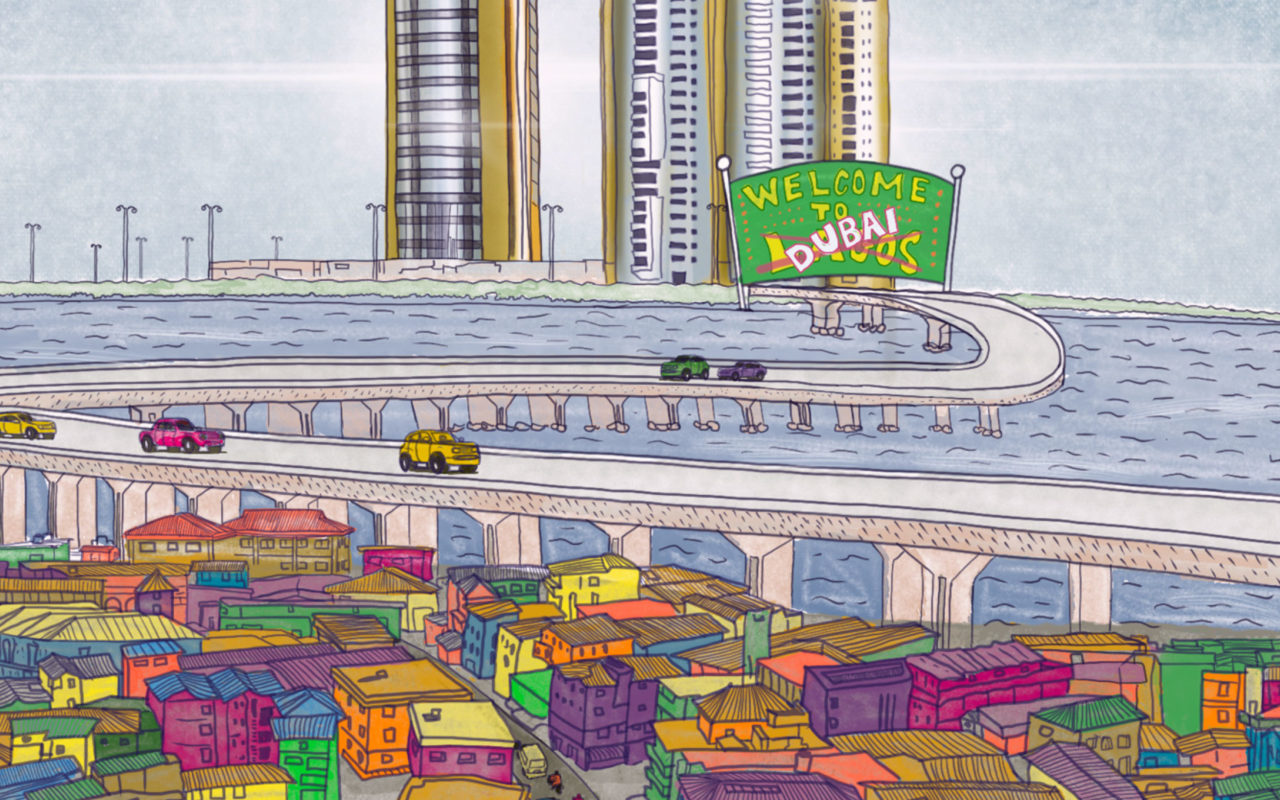Eko Atlantic "will help to diversify the economy of Nigeria, to brand Lagos all over the world, and to create an enormous number of opportunities," declared former American president Bill Clinton at the projects' dedication ceremony in 2013. He was one of the many attendees from the worlds of politics and finance who spoke glowingly and optimistically about Eko at the ceremony. Seven years later, what was supposed to be the premier piece of real estate in Nigeria - a "Dubai in Africa" - remains a massive, mostly empty and dusty construction site with three completed high rise buildings towering over it, and not much else.
"The project is a failure!!" declares Olamide Udoma-Ejorh. She is an architect and urban activist based in Lagos who says she is not surprised by its current state. In her view, Eko Atlantic was never the type of project Lagos needs in the first place. It ignored the vibrancy and reality of life in Lagos and has resulted in the loss of one of the city's most accessible public beaches by privatising it. Lagos needs housing for middle and low-income communities and a way to nurture and transform the informal economy that employs about three-quarters of the state's 7.5 million labour force, she argues.
For Edgar Pieterse, urbanist and director of the African Centre for Cities at the University of South Africa, there was no way the megacity's leaders could not fall for the pitch and glamour promised by Eko Atlantic. "If you are in any political position or running a city, probably 80 percent of what you do is hustle," he says. Developments of this nature are an easy sell to cities desperate to retain their middle class and earn much-needed tax revenue from high-value individuals and businesses who are the target. Like many cities across the world, Lagos is not immune to the allure of such prospects.
How does a city reconcile its need for investment with the demands of everyday people? Who are the primary beneficiaries of projects like Eko Atlantic, and is there another path for growing cities in desperate need of new revenue inflows?
EPISODE TRANSCRIPT
EDGAR PIETERSE: YOU KNOW SO… LAGOS IS A FASCINATING STORY, AND I THINK IS, IN FACT, ONE OF THE FEW EXAMPLES OF INCREDIBLE PROGRESS IN TERMS OF URBAN GOVERNANCE AND PLANNING AND MANAGEMENT. AND I KNOW THAT'S GOING TO SOUND A SURPRISE TO MANY LISTENERS.
TAU TAVENGWA: That is Edgar Pieterse. He is a Professor at University of Cape Town in South Africa where he is Director of the African Centre for Cities...
EDGAR: YOU KNOW THIS IS NOT SOME BASKET CASE AS PEOPLE OFTEN MAKE IT OUT TO BE. THERE’S STILL AND LOTS AND LOTS THINGS WRONG IN THIS CITY...
TAU: Edgar’s got a point I think. He's one of a growing number of experts I have heard speak of the city with a lot of optimism recently. And why not? Lagos is a massive city of about twenty million residents, making it one of a few mega cities in the world up there with New York, Tokyo, Mumbai and Beijing. But the truth is, it doesn't have a great reputation as a city. Dhashen, any idea why?
DHASHEN MOODLEY: We’ve all received that email from a Nigerian prince. Right? so we’ve come to associate this country with scammers. And we’re often told stories about how bribes make Nigeria work. So when we spoke with Edgar, his focus on the country’s progress was really refreshing...
TAU: Before we go too far, we need to introduce ourselves first… I am Tau Tavengwa. welcome to The City Show...
DHASHEN: ...and I’m Dhashen Moodley.
TAU: Back to Edgar...
EDGAR: THERE'S STILL LOTS AND LOTS AND LOTS OF THINGS WRONG IN THE CITY. BUT YOU DO HAVE SIGNIFICANT EVIDENCE OF KIND OF FOCUSSED PLANNING AND INVESTMENT AND CHANGE IN A RELATIVELY SHORT SPACE OF TIME. IF YOU JUST LOOK AT THE SCALE OF THE CITY AND WHAT THEY'VE BEEN ABLE TO ACHIEVE IN THE LAST 15 YEARS OR SO IN PARTICULAR, YES, INDEED, LAGOS IS ONE OF THE FEW MEGA CITIES IN AFRICA.
DHASHEN: ...So this is what we hope to do in each episode of The City Show. We’ll tell you a story you’ve probably heard of already, but we’ll tug at its edges a little to examine the bigger picture. As we are learning, it's often more complicated than you’d expect.
TAU: A little background Lagos’ infrastructure was laid down over a century ago without much room for expansion. It was also never really designed to serve everybody not least the millions of people it's trying to cater to now. So, it was exciting to be in Lagos in 2007 that’s when Babatunde Fashola was elected governor. He had run on a platform to fight and tackle corruption which made him very appealing to a lot of voters.
DHASHEN: When Fashola took over, he had to reform the city’s tax system. It was NOT easy, and...after the dust had settled, his government still had to figure out how to bring in sustained tax revenue...and also big, new investments. Edgar says the city desperately needed this...recognizing a universal truth...
REAL ESTATE, OF COURSE, IS ABSOLUTELY AT THE HEART OF THE MODERN CITY AND ESPECIALLY THE CAPITALIST CITY.
DHASHEN: And that is being translated into developments like this.
[PROMO VIDEO] EKO ATLANTIC IS A UNIQUE NEW CITY WITHIN A CITY THAT’S BEING BUILT ON A VAST AREA OF LAND, RECLAIMED FROM THE OCEAN ALONG THE COAST OF VICTORIA ISLAND IN LAGOS, NIGERIA.
DHASHEN: With apartments that start at one million dollars, the architect’s rendering in this promo video shows several gleaming towers, luxurious apartments...tennis courts...super yachts...it’s a shiny island paradise.
[PROMO VIDEO] THE BOLD VISION IT REPRESENTS IS UNCOMPROMISING TO BECOME THE FUTURE FINANCIAL CAPITAL OF AFRICA.
DHASHEN: This is from a promo released in 2011. Eko Atlantic was being sold, as the video is titled...as...The Dubai of Africa.
OLAMIDE UDOMA-EJORH: WHY ARE YOU CREATING DUBAI IN LAGOS? YOU KNOW, I MEAN LAGOS IS LAGOS. LAGOS IS NOT DUBAI. WHY DO THIS?
DHASHEN: That's Olamide Udoma-Ejorh, a planner and urban activist based in Lagos. She struggles with the Dubai pitch. As she says...Lagos is well...Lagos.
OLAMIDE: It's like, you know, putting a PARASITE, or you put a VIRUS or something into someone’s body, it tries to take over that person's body. It tries to KILL all the cells. So when I think of Eko Atlantic, and you're thinking about it, oh, this is a new Dubai is a new kind of living, you kind of think, are you trying to kill our CULTURE, are you trying to kill what we already have here in Lagos by bringing in this new Dubai, by taking something from another culture, another system and IMPLANTING it here? Why not celebrate what we already have, emphasise what we already have?
DHASHEN: Olamide runs the Lagos Urban Development Initiative. It’s an advocacy organisation focused on making Lagos more liveable and sustainable. She says this is hard to do, given the inequality in the city.
OLAMIDE: THE GAP BETWEEN THE CITIZENS AND THE GOVERNMENT IS GROWING DAILY. AND SO THERE ISN'T THAT KIND OF DISCUSSION OF WHAT IS NEEDED WITHIN THE CITY AND THEN WHAT ARE WE PLANNING FOR...?
DHASHEN: As plans for more developments like Eko Atlantic forge ahead, she understands why they are attractive to many Nigerians.
OLAMIDE: EKO ATLANTIC WAS SOLD AS THIS CITY WITHIN LAGOS. THAT WOULD HAVE, YOU KNOW, THE BEST WASTE MANAGEMENT, 24 HOURS SECURITY, 24 HOURS LIGHT, 24 HOURS POWER. THIS KIND OF SMART CITY, YOU KNOW, HIGH RISE BUILDINGS, THE BEST ARCHITECTS WOULD BUILD IN THE SPACE. YOU KNOW, A SPACE THAT WOULD HAVE GREAT PUBLIC PARKS AND MANMADE LAKES, AND SO IT WAS REALLY SOLD AS A PLACE THAT ISN'T NECESSARILY WHAT LAGOS IS...LIKE, AN IMPROVEMENT TO LAGOS. SO ALL THE INFRASTRUCTURE ISSUES YOU FACE WOULD BE SOLVED WITHIN EKO ATLANTIC. AND THEREFORE, YOUR LIFE WILL BE 100 TIMES EASIER.
DHASHEN: But the way they sold Eko Atlantic - with all these images and language of global aspiration - does NOT sit right with her.
OLAMIDE: YOU KNOW, THIS IDEA OF HIGH RISE BUILDINGS WITH GLASS AND PROMENADES AND WATCHING, DUCKS IN IN PONDS AND WHATEVER ELSE...FOR ME, I HAVE TO QUESTION, WHY USE THAT TERMINOLOGY, LIKE WHY USE THOSE WORDS TO DESCRIBE THIS SPACE. WHAT ARE YOU SAYING ABOUT LAGOS CULTURE OR LAGOSIAN CULTURE OR WHAT WE ALREADY HAVE, WHAT ALREADY EXISTS ON THE LAND? OBVIOUSLY THEY'RE TRYING TO SELL IT IN A WAY THAT THIS IS GOING TO MAKE YOUR LIFESTYLE IMPROVE, YOUR COMPANY WILL BECOME PRESTIGIOUS. YOU HAVE DIFFERENT EMBASSIES HERE. SO, YOU KNOW, YOU'RE KIND OF GLOBAL, YOU’RE NOT JUST A LAGOSIAN ANYMORE.
TAU: Urban expert Edgar Pieterse says THIS is the point when it comes to projects like Eko Atlantic which broke ground in 2008.
EDGAR: THE LEADERSHIP, OF COURSE, LATCHED ON TO THE USUAL DOGMAS ABOUT URBAN INVESTMENT AND THE KINDS OF URBAN INVESTMENT THAT WILL CHANGE THE GLOBAL IMAGE OF LAGOS AND THE IMPORTANCE OF REIMAGINEERING THE CITY AND SO FORTH. AND WHAT THEY THEN HAPPENED UPON, WHICH WAS PART OF A LARGER MOVEMENT IN THE CONTINENT, WAS TO PURSUE A HIGH END REAL ESTATE PROPOSITION WHERE YOU LEVERAGE IN THE PRIVATE SECTOR TO INVEST IN A MEGA DEVELOPMENT.
DHASHEN: And that development - Eko Atlantic - was a billboard to demonstrate to global investors that Lagos is ready to be a financial giant on the continent.
EDGAR: IT IS CONNECTED TO THE WORLD. AND IT IS CONFIDENT ABOUT ITS FUTURE. AND IT IS ABLE TO COMBINE, YOU KNOW, SORT OF HIGH END GLOBAL SYMBOLISM, REAL ESTATE SYMBOLISM WITH AN AFRICAN AESTHETIC. AND IT CAN BUILD A BUSINESS MODEL AROUND THE PUBLIC PRIVATE PARTNERSHIP WHERE THIS MAJOR DEVELOPMENT WOULD BE OFF THE BALANCE SHEET OF THE PUBLIC SECTOR. BUT IT WOULD BE ENABLED BY THE PUBLIC SECTOR. AND SO THAT WAS KIND OF THE BIG STORY OF THE LAST 10 YEARS, I GUESS. AND IN FACT, THEY'VE MADE SIGNIFICANT PROGRESS TO SORT OF RECLAIM THIS LAND FROM THE SEA, TO GET INVESTORS IN AND THE FIRST PHASES ARE UNDERWAY. BUT AS IS TYPICAL IN MANY OTHER AFRICAN CITIES, THE DISJUNCTURE BETWEEN THE BILLBOARD AND WHAT IS ACTUALLY HAPPENING ON THE GROUND IS VERY SIGNIFICANT AND VERY TELLING.
DHASHEN: Olamide says what IS very telling at the moment is that its biggest similarity to Dubai right now...is the sand surrounding it.
OLAMIDE: SO RIGHT NOW EKO ATLANTIC LOOKS LIKE A DESSERT MAYBE THAT’S HOW I’D DESCRIBE IT… HAHA...IT’S JUST A LOT OF SAND. ONCE YOU GO THROUGH THE GATES, THERE ARE ROADS BUT THEN EVERYTHING ELSE AROUND YOU IS SAND. SO IT'S KIND OF LIKE THIS GATED DESERT.
DHASHEN: …that was actually back in February, so we reached out by email to Eko Atlantic to check on its progress. We didn’t get a response…nor did we have any luck with recent calls to its sales office or headquarters.
AX: THE NUMBER YOU HAVE CALLED IS TEMPORARILY OUT OF SERVICE...REPEATS (fade out)
DHASHEN: On their website, Eko Atlantic says they’re planting 200,000 trees. By June 2021, at least 1 commercial and 2 residential buildings have been completed. That’s nowhere near the project's promotional materials that show multiple skyscrapers and vibrant surroundings. Since COVID-19 struck the city, not much has gone on within its walls.
OLAMIDE: I FEEL LIKE EKO ATLANTIC HAS FAILED IN ITS PROMISE BECAUSE HARDLY ANYBODY CAN LIVE THERE AT THE MOMENT...BECAUSE THERE NO HOUSES, NOTHING HAS BEEN BUILT. I'M SURE PEOPLE THAT CURRENTLY LIVE ON EKO ATLANTIC HAVE TO WORK IN V.I. OR IKOYI OR OTHER PARTS OF LAGOS, BECAUSE AT THE MOMENT THERE'S NOTHING ELSE THERE. THERE'S NO SHOPS, NO RESTAURANTS. THERE'S NOTHING THERE AT THE MOMENT. SO THEY WOULD HAVE TO COME OUT OF EKO ATLANTIC, AND BACK INTO LAGOS TO PRETTY MUCH LIVE THEIR LIFE.
DHASHEN: And for urban activist Olamide, the lack of people around feels strange because Eko Atlantic was built on the popular Bar beach.
OLAMIDE: THAT WAS A PUBLIC SPACE. AND SO, ANYBODY FROM ANY PART OF LAGOS COULD GO ENJOY THE BEACH, CAUSE OTHER BEACHES IN LAGOS ARE QUITE FAR AWAY. AND SO FOR ME, THIS WAS LIKE THE SHOCKING KIND OF NEWS THAT THIS PUBLIC SPACE, WAS NOW BECOMING THIS KIND OF PRIVATE, HIGH END DEVELOPMENT.
DHASHEN: The developers of Eko Atlantic say that Bar Beach was vulnerable to flooding due to years of coastal erosion. They started by building the Great Wall of Lagos - a large barrier - that would protect the emerging new city, as well as Victoria Island, from ocean surges...But Olamide says the place is now pretty much reserved for only the elite.
OLAMIDE: FOR ME THAT IS EXTREMELY PROBLEMATIC. BECAUSE WHAT'S HAPPENING TO THE REST OF THE POPULATION, ALSO WHAT SOLUTIONS ARE YOU PROVIDING REALLY THEN?
DHASHEN: Her scepticism is understandable in a city like Lagos where the rich keep getting richer and the poor can only dream...and where so many public services need to be upgraded. So, who do developments like Eko Atlantic really help?
OLAMIDE: BECAUSE IF YOU'RE TALKING ABOUT HOUSING, THERE IS ENOUGH HOUSING FOR THE HIGH INCOME EARNERS ALREADY IN LAGOS. IT'S LOW INCOME AND MIDDLE INCOME EARNERS THAT DON'T HAVE HOUSING. SO YOU'RE NOT HELPING IN THE HOUSING SOLUTION. EMPLOYMENT, AGAIN, WHAT EMPLOYMENT HAVE THEY ACTUALLY CREATED WITHIN EKO ATLANTIC? NONE. THE ONLY THING THEY CAN SAY THEY'VE BUILT IS THIS GREAT WALL OF LAGOS, WHICH IS SUPPOSED TO STOP FLOODING. BUT EVEN AT THAT, IT HAS BEEN EXPLAINED BY EXPERTS AND ENVIRONMENTALISTS THAT THE HARM THAT THEY'VE ALREADY CAUSED BY DREDGING WILL ACTUALLY MAKE FLOODING WORSE. THE PROJECT IS A FAILURE.
TAU: But it was destined to be a big success. In early 2013 there was still a lot of optimism about the project. Former American president Bill Clinton came to Lagos to give it a boost...
[PROMO VIDEO:] IT WILL HELP TO DIVERSIFY THE ECONOMY OF NIGERIA, TO BRAND LAGOS ALL OVER THE WORLD, AND TO CREATE AN ENORMOUS NUMBER OF OPPORTUNITIES.
TAU: Edgar Pieterse says it's kind of obvious why Nigeria’s leaders jumped at this. Why wouldn't they?
EDGAR: FOR ME, IT'S NOT A SURPRISE THAT POLITICAL LEADERS WILL BE IMPRESSED WITH MODERN EXAMPLES THAT GIVE THE IMPRESSION THAT IT IS POSSIBLE TO SANITISE A CITY. RIGHT. THAT YOU CAN HAVE THESE GLEAMING BUILDINGS, NO WASTE ANYWHERE, NO BEGGING ANYWAY, NO CRIPPLED PEOPLE ASKING FOR MONEY AT TRAFFIC LIGHTS, ETC ETC... IT'S, YOU KNOW, THAT IMAGINATION, THAT FANTASY IS OBVIOUSLY APPEALING FOR ANY POLITICIAN. SO THE FACT THAT, YOU KNOW, PLACES LIKE SINGAPORE, DUBAI AND SO FORTH, WHO, OF COURSE, COME FROM A COMPLETELY DIFFERENT HISTORICAL CONTEXT AND HAVE A VERY DIFFERENT CAPITAL BASE ARE ABLE TO SAY WE'VE CRACKED IT. WE'VE GOT A MODEL FOR YOU TO EMULATE. I MEAN, I FIND IT TOTALLY UNSURPRISING THAT POLITICAL LEADERS IN AFRICAN CITIES WOULD BE CHARMED BY THIS.
TAU: The question for me is are these kinds of developments MORE about THOSE political leaders and elites than they are about the lives of ordinary Lagosians?
EDGAR: IF YOU'RE IN A POLITICAL POSITION OR YOU'RE RUNNING A CITY AND SO ON. RIGHT. PROBABLY 80 PERCENT OF WHAT YOU DO IS A HUSTLE. RIGHT. I MEAN, THAT'S HOW THE GLOBAL CAPITALIST SYSTEM WORKS. YOU KNOW, YOU TALK A GOOD GAME. YOU PUT YOUR BEST FOOT FORWARD, BECAUSE YOU'RE BASICALLY YOU'RE SELLING YOURSELF. RIGHT. SO WITH ALL OF THIS SORT OF MILLENNIAL DISCOURSE ABOUT YOU ARE YOUR BRAND, YOU KNOW, CITIES KIND OF HAVE TO BUY INTO THE SAME CONCEIT. OF COURSE, THAT'S BULLSHIT. BUT AT THE SAME TIME, YOU CAN'T NOT PLAY THE GAME BECAUSE THEN YOU'RE COMPLETELY INVISIBLE AND IRRELEVANT.
DHASHEN: Olamide says it’s the ordinary citizens of Lagos who are completely invisible and irrelevant...to developers.
OLAMIDE: DEVELOPERS ARE NOT NECESSARILY THINKING EVEN OF THE NEEDS OF PEOPLE, BUT JUST WHAT NEEDS TO HAPPEN IN LAGOS.
DHASHEN: She says to make developments like this WORK, they need to be more inclusive to THE PEOPLE who MAKE them work.
OLAMIDE: FOR A LOT OF THINGS TO FUNCTION IN LAGOS, AT SOME POINT THERE IS THE INFORMAL SECTOR. AND, YOU KNOW, EVEN IF IT'S CLEANERS, THESE CLEANERS HAVE TO COME FROM SOMEWHERE OUTSIDE OF THAT GATED COMMUNITY AND COME INTO THAT SPACE.
DHASHEN: The informal sector makes up around three-quarters of Lagos’ labour force, and contributes nearly half of its economy. Even in private developments, like Eko Atlantic, residents will have to rely on the informal sector to clear away their garbage.
OLAMIDE: SO AT SOME PARTS OF LAGOS, YOU'RE GOING TO HAVE THE INFORMAL SECTOR COLLECTING YOUR WASTE AND TAKING IT TO A LANDFILL. IT MEANS EVEN IF YOU'RE COLLECTING WASTE AND PUTTING IT SOMEWHERE WITHIN THAT GATED COMMUNITY, SOMEONE STILL HAS TO GO AND PICK IT UP AND TAKE IT TO THE LANDFILL. SO THERE'S ALWAYS INTERJECTIONS OF THE INFORMAL SECTOR. WHETHER YOU YOU'RE BUILDING AN ISLAND OR A GATED COMMUNITY, RECLAIMING AN ISLAND, THERE IS ALWAYS GOING TO BE THAT PART OF LAGOS THAT YOU REALLY CAN'T LET GO OF BECAUSE THAT INFRASTRUCTURE DOESN'T EXIST OUTSIDE OF THE GATED COMMUNITY.
TAU: I think acknowledging the role of the informal sector in developments like Eko Atlantic is absolutely crucial especially if you’re trying to transform a city like Lagos and make it work for everybody.
Let’s go back to Edgar again...
EDGAR: THAT'S WHAT'S USUALLY MISSING FROM A LOT OF THESE INTERVENTIONS. THEY GENUINELY BELIEVE THEIR OWN HYPE. THEY THINK THAT IF THEY DO GET MONEY FOR A KONZA CITY, OR AN EKO ATLANTIC, OR WHATEVER IT IS THAT AKON IS DREAMING UP, IS THAT THAT IS SOMEHOW GOING TO HAVE THE CATALYTIC EFFECT TO TRANSFORM THE REST OF THE CITY. THEY DON'T UNDERSTAND THAT THAT IS JUST A VERY SMALL PART OF A MUCH LARGER PORTFOLIO OF THINGS YOU'VE GOT TO DO. AND IN FACT, YOU PROBABLY HAVE TO OFFSET THE NEGATIVE EFFECTS OF THAT PART OF THE PORTFOLIO.
PROMO VIDEO AX: “ONE OF THE QUESTIONS WE GET A LOT IS WHO IS BUILDING EKO ATLANTIC. IS IT A GOVERNMENT PROJECT? OR IS IT A PRIVATE PROJECT? LET’S ANSWER THAT.”
DHASHEN: Gilbert and Ronald Chagoury, two wealthy and politically connected Nigerian brothers of Lebanese-descent, dreamed up Eko Atlantic. And it’s funded by a collection of African and international banks.
OLAMIDE: WHEN I LOOK AT EKO ATLANTIC AND I LOOK AT A LOT OF BUILDINGS, NOT JUST DEVELOPMENTS IN LAGOS AND THAT ARE SITTING EMPTY, THERE IS THIS IDEA OF, OH, WAS IT REALLY BUILT JUST FOR LAUNDERING MONEY OR WAS IT REALLY BUILT, YOU KNOW, TO CLEAN MONEY? AND YOU HAVE TO ASK THOSE QUESTIONS ABOUT EKO ATLANTIC, TOO, BECAUSE IF THAT'S THE CASE, THEN ACTUALLY PROBABLY NOTHING ELSE IS GOING TO BE DONE, AND THE LAND IS JUST GOING TO STAY AS IT IS.
TAU: Like Olamide says perhaps this is the moment to change course. And Edgar certainly thinks it is time that Lagos’ developers listened to activists and practitioners like her.
EDGAR: THERE'S A VERY STRONG SORT OF SECTOR THERE THAT IS ROOTED IN THE HUMAN RIGHTS TRADITION, YOU KNOW, WHERE THEY KIND OF PROTECT PEOPLE AGAINST FORCED EVICTIONS AND ENVIRONMENTAL POLLUTION AND THAT KIND OF WORK. AND I THINK THOSE ORGANISATIONS THAT ARE VERY WELL SUPPORTED AND WELL-ENDOWED, CAN BEGIN TO ARTICULATE THEIR CLAIMS AND THEIR DEMANDS IN RELATION TO A BROADER METROPOLITAN PERSPECTIVE ON WHAT LAGOS COULD BECOME.
DHASHEN: While Olamide remains skeptical about Eko Atlantic, she can also see a possible way forward…
OE15: EKO ATLANTIC HAS TO CHANGE THE WAY IT’S THINKING ABOUT ITSELF AND OPEN IT UP TO THE PUBLIC. THE BEST THING IS TO BE INNOVATIVE AND CREATIVE. TRYING TO THINK A LITTLE BIT DIFFERENT, TRYING TO ENCOURAGE MORE PARTICIPATION AND UNDERSTANDING WHAT THE NEEDS ARE OF LAGOS AND NOT JUST, A FEW PEOPLE… BUT ALSO WITH THE PEOPLE WHO ALREADY LIVE AND WORK IN THOSE AREAS.
DHASHEN: So, where do you think this leaves us Tau?
TAU: For me right back to where we started I desperately want Edgar to be right about Lagos and for it to be this beacon that as Africans, we could all look to as a great city. BUT Olamide she’s on the ground which gives her perspective to be justified in demanding a re-think. Whatever resolution there is, might lie somewhere in the middle...
DHASHEN: That’s it for this episode of the City Show., I’m Dhashen Moodley.
TAU: I’m Tau Tavengwa









